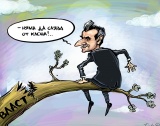АБОНАМЕНТ ЗА НОВИНИ [X]
Reuters: България се готви за скок
 07:30 | 26.09.2013
07:30 | 26.09.2013 997
997  коментари 0
коментари 0
През 2014 г. българската икономика ще нарасне с до 2% в резултат на политиките на правителството за постигане на растеж и заетост. Това заяви министърът на финансите Петър Чобанов във формата на „Ройтерс" „Инвестиционен форум за Източна и Централна Европа", съобщи пресцентърът на МФ. Резултатите от второто тримесечие на тази година не ни дават основание да очакваме възстановяване на икономиката, коментира той и допълва, че очакваният икономически ръст за 2013 г. е около 0,6%, като основният проблем продължават да бъдат слабите инвестиции. Според него, общественото недоволство също е повлияло негативно върху икономическото развитие на страната. Министър Чобанов каза още, че за следващата година ще се стремим към бюджетен дефицит под 2% от БВП, колкото е предвиденият за тази. Правителството актуализира фискалната цел за 2013 г. от 1,3% до 2% от БВП, за да стимулира икономиката и да помогне на нуждаещите се, припомнят от „Ройтерс".
България има възможност да набере още до 400 млн. евро до края на годината, но все още предстои да бъде решено дали това ще бъде под формата на синдикиран заем или на еврооблигации, уточни министър Чобанов. През следващата година ще се наложи излизане на международните пазари, за да се рефинансира емисията на глобални облигации деноминирани в долари с падеж януари 2015 г. в размер на около 1,1 млрд. долара. Петър Чобанов увери, че експертите в МФ ще започнат да следят и наблюдават отблизо пазарните условия още от началото на годината. С ниво на държавния дълг от 17% от БВП България се нарежда сред най-малко задлъжнелите страни, както и сред страните с най-нисък бюджетен дефицит в ЕС, се допълва в анализа на „Ройтерс". Министърът на финансите Петър Чобанов определи политическата ситуация в страната като предизвикателство, което обаче помага на управляващите да бъдат фокусирани, да работят прозрачно и да представят реформи и мерки, които да рестартират икономиката. Според него, съвсем скоро ще се видят резултатите от тези мерки и те ще доведат до подобряване на бизнес средата.Ето и оригиналното съобщение на Reuters.
Bulgaria draws protests lesson, gears up for growth (Reuters) - Bulgaria is gearing up for robust growth next year on employment-focused policies despite a challenging political situation due to months-long street protests against its Socialist-led government, its finance minister said. Petar Chobanov told a Reuters Investment Summit held in Sofia on Tuesday he did not see "a political crisis," in the country as the streets protests against alleged corruption have eased, after a siege of parliament in July. "The (political) environment is quite challenging but it helps us be more focused and really present reforms and measures that will be helpful to restart growth," said the 37-year-old technocrat. "Soon we will see the results of these measures in terms of improving the business environment," Chobanov added. The protests have eased, but opinion polls showed that half of Bulgarians believe the cabinet should step down by next May. "We have the government. It has its 100 days. We are following our strategy...Protests and the street are also important to be transparent and do our best to make reforms," he said. The fragile government controls barely half of the seats in parliament and protests were being held for nearly three months against perceived murky business in the EU's poorest member where wages average 400 euros ($540)a month. Chobanov said public discontent had already taken toll on economic growth, now forecast at a meager 0.6 percent this year on slow investment but it was set to expand towards 2 percent in 2014. Economists blamed political instability for forcing Bulgarians to spend less and turn to saving instead. They are less optimistic on growth as political uncertainty deters investment and have warned populist policies, such as decreasing electricity costs by 5 percent as of August, might backfire. Chobanov said the government will target a lower fiscal deficit next year of 1.8-2 percent of GDP against this year's 2 percent and Bulgaria may seek up to 400 million euros ($540 million) in a yet to be decided syndicated loan or eurobond later this year. Bulgaria will also have to tap global markets next year to rollover the maturing $1.1 billion in dollar-denominated bonds in January 2015, and Chobanov said his ministry will start to watch closely the markets from the start of 2014. With public debt at 17 pct of GDP, Bulgaria will still be one of the small fiscal deficits in the 28-member bloc and is one of its least indebted members. The government had previously revised this year's fiscal target upwards to 2.0 percent of gross domestic product from 1.3 to spur the economy and help the needy, overturning a presidential veto and defying protests over raising fresh debt. The Black Sea state must run small fiscal deficits to protect its currency peg to the euro, as it operates under a regime which does not allow the central bank set interest rates, leaving fiscal policy as the main tool to influence the economy.| Tweet |
|













